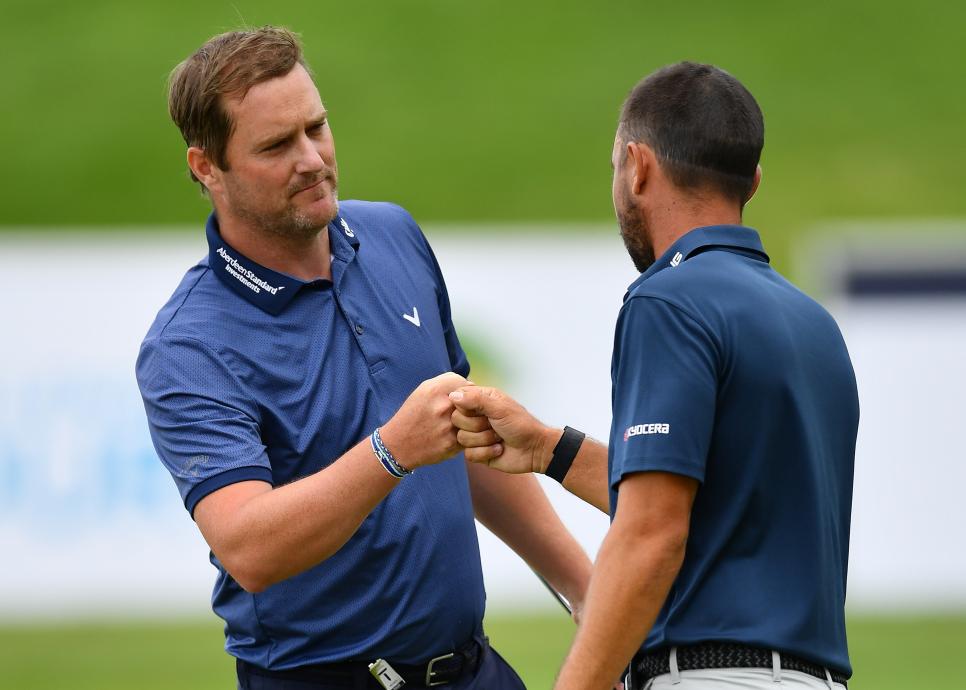Stuart Franklin
Marc Warren of Scotland is congratulated by Sebastian Garcia Rodriguez of Spain on the 18th green after winning the Austrian Open.
By John Huggan
There have been more than a few good things in the professional life of Marc Warren.
As far back as 2001, the now-39-year old Scot—part of a team that included Luke Donald and Graeme McDowell—holed the putt that won the Walker Cup for Great Britain & Ireland at Sea Island in Georgia.
Four years later, Warren’s beautifully rhythmic full swing carried him to the top of the rankings on the European Challenge Tour. Twelve months after that, he was Rookie of the Year on the European Tour, having won the Scandinavian Masters en route. In 2007, he was victorious again in the Johnnie Walker Championship at Gleneagles, a triumph that went a long way towards him qualifying for the two-man team that would represent Scotland in the World Cup. Alongside Colin Montgomerie, Warren won there, too, beating the United States in a playoff at Mission Hills in California.
All of which is pretty good you might think, especially when you throw in a third European Tour win at the 2014 Made in Denmark. But Warren has endured almost as many “downs” as “ups” in his 18-year pro career. Many opportunities have been spurned, most notably at the 2012 Scottish Open. One stroke clear with four holes to play at Castle Stuart, Warren dropped four shots over the closing holes to finish one shot out of the playoff between eventual champion Jeev Milkha Singh and Francesco Molinari.
Still, none of the above will surely matter too much now to the former World Boys champion. Not now that he has recorded his fourth tournament victory on the Old World Circuit. Having lost his European Tour card in each of the last two years—he finished 130th on the Race to Dubai in 2018, 205th last year—Warren is exempt for at least the rest of this season and all of next, courtesy of victory in the Austrian Open, which was co-sanctioned with the Challenge Tour.
That fact was soon reflected in tweets from two former Ryder Cup captains. “He’s back,” wrote Thomas Bjorn. “Never say die,” was the tribute from Warren’s fellow-Scot, Sam Torrance.
It was an odd week in other ways, too, in what was perhaps a glimpse into a more impecunious—the total prize fund was a “mere” €500,000—and “new-normal” post-coronavirus future for professional golf in Europe. Many players, Warren included, were carrying their own bags. Every player was marking his own card. Only one caddie was touching the pin on each green. All very new on a circuit that was playing for the first time since the Qatar Masters in early March.
Anyway, with an erratic final round of 70 over the Diamond Country Club just outside Vienna—one that contained four bogeys—Warren made two of his six birdies in the last four holes to reach 13 under par and pick up the first-place check of €76,823. Germany’s Marcel Schneider was second, one shot back, with Will Besseling of the Netherlands next with an 11 under on the card. Two of Warren’s young compatriots, Connor Syme and Craig Howie, were among a four-strong group in a tie for fourth place.
“This is massive,” said Warren. “A few hours ago, I didn’t have full status. Now I’m in a winner’s category and can plan the year. I just need to keep doing what I’m doing, trying to hit one shape all the time and when I do play try and do that and try not to mess about too much.
“The last few weeks I’ve been able to get some good work done and get ready to play golf. Came out of it pretty refreshed. Carrying my bag this week probably helped tone it down a little, just going out and playing and seeing what happens. The result couldn’t have been any better.”
A little farther down the leaderboard, halfway leader Miguel Angel Jimenez’s quest to break his own record as the oldest-ever winner on the European Tour ended in a T-8 finish, five shots behind the champion. The 56-year old Spaniard matched Warren’s closing 70, but was undone 24 hours earlier by a third round of 77.









